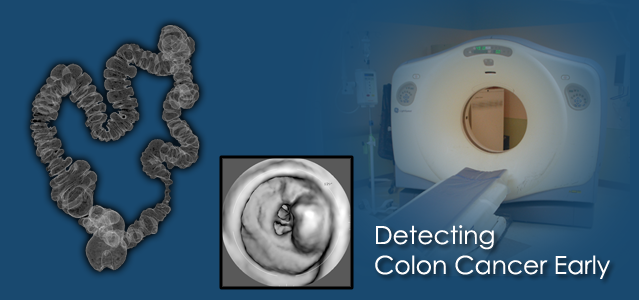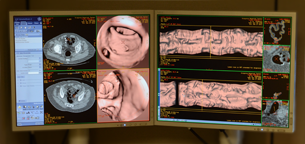CT Colonography

Northern Virginia Radiology Consultants is proud to offer CT colonography. CT colonography (CTC) is a minimally invasive method for screening and diagnosing colorectal cancer. Drs. Raphael and Petrovitch have specialized training in supervising and interpreting CT colonography.
About Colorectal Cancer
Colorectal cancer is cancer of either the colon or rectum. The colon and rectum are the last parts of the digestive tract, which also includes the esophagus, stomach, and small bowel. Colorectal cancer is the third most common cancer among men and woman, (excluding cancers of the skin), and is the second leading cause of death of men and women combined. Over 140,000 people were diagnosed with colorectal cancer in 2010, and the lifetime risk of developing colon cancer is 5.2%.1
Fortunately, colorectal cancer can be stopped and cured if it is caught early. In most cases of colon cancer, the process of occurs over several years. The cancer begins within a lesion known as a polyp. There are several types of polyps which form in the colon, some of which are benign and will not become a cancer such as a hamartomatous or post-inflammatory polyp, while some are considered pre-malignant (or pre-cancerous) such as an adenomatous polyp. Adenomatous polyps have the potential to become cancer, but not all do. The goal of colorectal screening is to identify these polyps at an early stage while they are small and have not developed into malignant cancers.
What is CT Colonography?

NVRC uses advanced software to improve lesion detection.
CT colonography (CTC) is a minimally invasive method for screening and diagnosing colorectal cancer. The study is performed using a special machine known as a CT scanner. A CT scanner uses x-rays to take hundreds of pictures of your body that are then reviewed by a specially trained radiologist. The images are reviewed on a specialized workstation designed specifically to evaluate the colon and rectum. 3D images of the colon are created that allow the radiologist to “fly-through” the colon is the same fashion as a colonoscopy and look for polyps or cancer.
How long does it take?
CT colonography is a relatively quick examination. After arriving and registering, the patient is escorted to the CT scanner suite where the patient will lie on the CT scanner bed. A small flexible tube is inserted into the rectum and air is slowing injected to distend the colon. Images are then acquired while the patient is lying on his back, and again while lying on his stomach. Each scan takes approximately 10-20 seconds. After the two scans, the tube is removed and the study is complete.
Is it painful?
While some patients do experience mild discomfort while the colon is distended with air, the study is quick and anesthesia is typically not required. Inform the CT technologist if you have any discomfort during your exam.
Do I need to prepare for the exam?
Yes. Similar to the preparation for a colonoscopy, the colon and rectum must be cleansed prior to the examination. The patient is directed to pick up the CT colonography kit at least five days prior to the examination. The patient follows simple set of instructions prior to the study on how to perform the cleansing. This is a critical step as a properly prepared colon yields the most sensitive and accurate study results.
Download CT Colonography Prep Instructions
What are the risks and side effects?
Some patients do report abdominal cramping and excess gas after the exam. This is caused by the air that was injected into the rectum. This typically passess quickly after the examination. Rarely, there is the risk of causing injury to the colon, such as perforation, after the injection of air. However, this risk is small and is typically considered less than the risk of perforation from colonoscopy. Because a CT scanner uses x-rays, the patient is exposed to a small amount of radiation.
Will my insurance cover this test?
The state legislatures of Virginia, D.C., and Maryland have passed laws requiring coverage for CT colonography as a Colorectal Cancer Screening procedure. However, despite this and evidence proving the effectiveness and utility of CT colongraphy, many insurance carriers and Medicare have varying policies regarding coverage for this examination.
Medicare currently covers CT colonography under certain specific conditions. Medicare will cover CT colonography in patients in whom a standard colonoscopy of the colon is incomplete due to an inability to pass the colonoscope proximally in the colon. Medicare will also cover CT colonography in patients undergoing preoperative cancer staging and determination of colonic wall invasion. Lastly, Medicare will cover CT colonography for patients in whom a standard colonoscopy is contraindicated. The following are considered contraindications for standard colonoscopy, and would therefore be a covered indication for CT colonography: coagulopathy, increased risk of sedation, diverticular disease with acute diverticulitis or severe diverticulosis where the patient would be at increased risk from standard colonoscopy, complications from a prior standard colonoscopy, or colonic obstruction.
Please contact your private insurance carrier, speak with your doctor, or contact NVRC if you have questions or concerns regarding coverage for CT colonography.
How can I learn more about CT colonography?
If you would like to learn more about CT colonography, please feel free to contact either Drs. Raphael or Petrovitch at (703) 558-6730 or ask your primary care physician. You can learn more online about CT colonography at RadiologyInfo.org.
References:
1. American Cancer Society, www.cancer.org, accessed 1/15/2011.
Disclaimer: Please note, the information on this site is for informational purposes only and should not be construed as medical advice. Please ask your doctor if you have any questions regarding your care.
